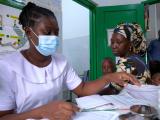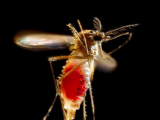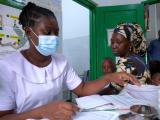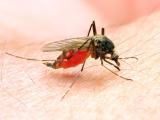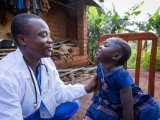Oct 21, 2008 (CIDRAP News) – The philanthropic arm of the Internet search company Google today announced it is awarding more than $14 million for various projects aiming to prevent the next pandemic by detecting new pathogens and disease outbreaks in Africa and Southeast Asia.
The awards by Google.org are going to six different initiatives aiming to "identify hot spots where new diseases may emerge, detect new pathogens circulating in animal and human populations, and respond to disease outbreaks before they become global crises," the company said in a news release.
"Business as usual won't stop the next AIDS or SARS," Dr. Larry Brilliant, Google.org executive director, said in the news release. "The teams we're funding today are on the frontiers of digital and genetic early detection technology. We hope that their work, with partners across environmental, animal, and human health boundaries, will help solve centuries-old problems and save millions of lives."
The statement said three of the grants are for efforts to use mapping and weather and climate data to help predict where and when disease outbreaks will occur:
- The Woods Hole Research Center in Falmouth, Mass., will receive $2 million to support satellite mapping of forests to improve monitoring of forest loss and settlement expansion in tropical countries.
- Columbia University International Research Institute for Climate and Society will get $900,000 to improve the use of forecasts, rainfall data, and other climate information in East Africa and to link weather and climate experts to health specialists.
- University Corporation for Atmospheric Research in Boulder, Colo., is awarded $900,000 to develop a system for using weather projections to inform and target responses to disease threats in West Africa.
"For Rift Valley fever and malaria, long-term weather forecasts and deforestation maps can show us where to look for outbreaks, up to six months in advance," said Frank Rijsberman, director of the grant program for Google.org.
The other three grants, the company said, are for projects designed to detect early signals of possible epidemics through blood sampling, molecular diagnostics, mining of digital data, and other surveillance efforts:
- The Global Viral Forecasting Initiative (GVFI) will receive $5.5 million for collecting and analyzing blood samples from humans and animals in hot spots in Cameroon, the Democratic Republic of Congo, China, Malaysia, Lao PDR, and Madagascar. The grant will be matched by the Skoll Foundation. Dr. Nathan Wolfe, GVFI's founder and director, said the project's aim is to monitor the movement of viruses from animals into people.
- Columbia University Mailman School of Public Health, New York City, is awarded $2.5 million to support research to speed the discovery of new pathogens and promote rapid regional responses to outbreaks by establishing molecular diagnostics in hot spot countries, including Sierra Leone and Bangladesh. Columbia's Dr. Ian Lipkin and colleagues already have discovered more than 75 viruses.
- Children's Hospital Corp., in Boston, will receive $3 million to combine the online disease-detection efforts of HealthMap with ProMED-mail's global network of human, animal, and ecosystem health specialists who report disease outbreaks. The project will assess emerging-disease reporting systems, expand networks in Africa and Southeast Asia, and develop news tools to improve outbreak detection.
See also:
Oct 21 Google release
http://www.google.com/intl/en/press/pressrel/20081021_googleorg.html
July 21 CIDRAP News story describing HealthMap and other nontraditional disease-monitoring initiatives: "More efforts look outside the box for outbreak signals"
